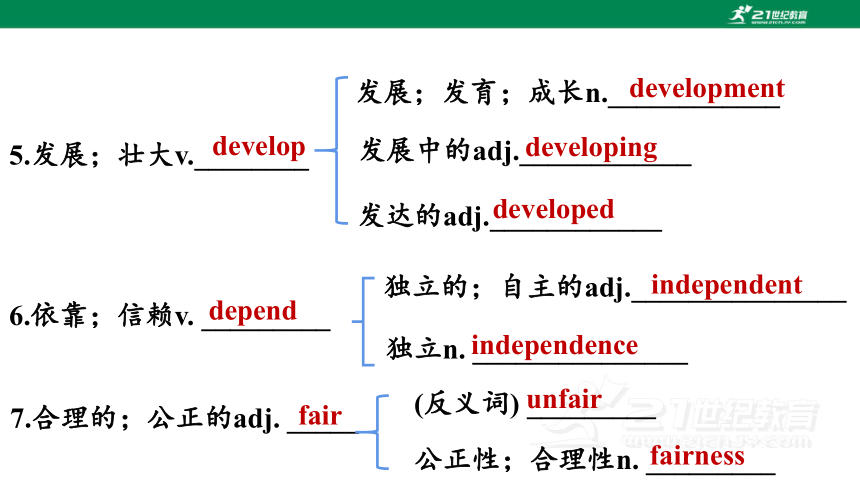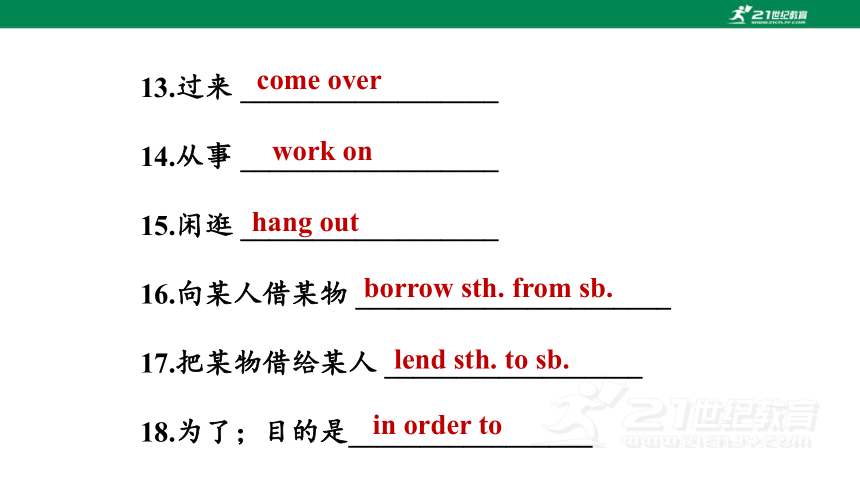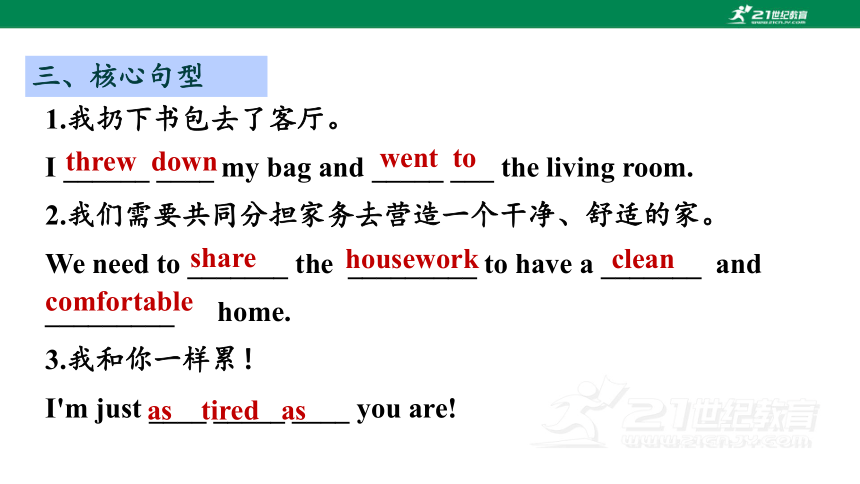Unit 3 Could you please clean your room?单元复习课件(共28张PPT)
文档属性
| 名称 | Unit 3 Could you please clean your room?单元复习课件(共28张PPT) |  | |
| 格式 | pptx | ||
| 文件大小 | 921.6KB | ||
| 资源类型 | 试卷 | ||
| 版本资源 | 人教新目标(Go for it)版 | ||
| 科目 | 英语 | ||
| 更新时间 | 2023-05-29 16:13:42 | ||
图片预览









文档简介
(共28张PPT)
Unit 3 Could you please
clean your room
单元复习
人教版八年级下册
单元知识点梳理
一、词汇拓展
单元知识点梳理
1.扫;打扫v. _________
(过去式) _________
(过去式) _________
(过去式) _________
(过去式) _________
2.扔;掷v. _________
3.借给;借出v. _________
4.厌恶v. _________
sweep
swept
throw
threw
lend
lent
hate
hated
(过去分词) _________
swept
(过去分词) _________
thrown
(过去分词) _________
lent
发展;发育;成长n.____________
独立的;自主的adj._______________
独立n. _______________
5.发展;壮大v.________
6.依靠;信赖v. _________
develop
development
depend
independent
independence
(反义词) _________
公正性;合理性n. _________
7.合理的;公正的adj. _____
unfair
fairness
fair
发展中的adj.____________
developing
发达的adj.____________
developed
9.邻居n. ____________
街区;街坊n. ________________
疾病n._________
(过去式) _________
10.有病;不舒服adj. ____
11.落下;掉下v. ______
neighbor
ill
illness
drop
dropped
neighborhood
近义词adj._________
sick
(过去分词) _________
dropped
8.精神压力;心理负担n. ________
焦虑不安的adj. _________
stress
stressed
二、词块归纳
1.洗碗 _______________________
2.叠衣服 __________________
3.对某人生气 __________________
4.惊讶地 __________________
5.搭便车 __________________
6.一……就……_________________
wash/do the dishes
fold the clothes
be angry with sb.
in surprise
get a ride
as soon as
7.倒垃圾 ______________________
8.扫地 __________________
9.铺床 __________________
10.遛狗 _______________________
11.频繁;反复 _________________
12.把某物递给某________________
take out the rubbish
sweep the floor
make the bed
take the dog for a walk
all the time
pass sth. to sb.
13.过来 __________________
14.从事 __________________
15.闲逛 __________________
16.向某人借某物 ______________________
17.把某物借给某人 __________________
18.为了;目的是_________________
come over
work on
hang out
borrow sth. from sb.
lend sth. to sb.
in order to
19.结果 __________________
20.做家务 __________________
21.依靠;信赖 __________________
22.浪费时间 __________________
23.取得好成绩 __________________
24. 照料;照顾_________________
25.培养孩子的独立性好成绩 __________________
as a result
do chores
depend on
a waste of time
get good grades
take care of/look after
develop children’s independence
三、核心句型
1.我扔下书包去了客厅。
I ______ ____ my bag and _____ ___ the living room.
2.我们需要共同分担家务去营造一个干净、舒适的家。
We need to _______ the _________ to have a _______ and _________ home.
3.我和你一样累!
I'm just ____ _____ ____ you are!
threw down
went to
share
housework
as tired as
clean
comfortable
三、核心句型
4.第二天,我妈妈下班回家发现房子很干净、整洁。
The next day,my mom came home from work to ______ ____ ______ ______ _____ ________.
5.至少让我看完这个节目可以吗?
________ _____ at least _________ _________ this show
6.我不能白天全天工作,整个晚上还做家务。
I can’t ______ ____ _____ and ____ _________ all evening.
find the
house clean and tidy
Could I
finish watching
work all day
do housework
7.整整一周,她没做任何家务,我也没做。
____ ____ _____,she did not do any housework and ______ ___ I.
8.我刚在电视机前坐下,我妈妈就过来了。
____ ______I sat down in front of the TV,my mom _____ ___.
9.而且,他们长大之后,将不得不做家务,因此,他们没必要现在就做。
Also,when they get older,they will have to do housework so ______ __ __ ______ ___ ____ ___ __ __ now.
For one week
neither did
The minute
came over
there is no need for them to do it
10.为了取得好成绩并进入好大学,他们应该把时间花在学业上。
They should ______ their time ____ schoolwork __ ____ __ ____ good grades and ___ ___ a good ______ .
11.如今的孩子们太依赖他们的父母了。
Children these days ____ _______ their parents____ ______.
12. 做家务帮助培养孩子们的独立能力,并教他们如何照顾自己。
________ chores helps to ______ children’s ______________ and ______ how to ______________________.
spend
on
in order to get
get into
university
depend on
too much
Doing
develop
independence
teaches
look after themselves
13.只在学校取得好成绩是不够的。
____ ___ ___ ______ ___ just ____ good grades at school.
14.孩子们越早学会独立,对他们的未来就越好。
____ _______ kids learn to be independent,____ ______it is for their future.
15.我不介意做它们。
I ___ ___ ____ ____ them.
It is not enough to
get
The earlier
the better
do not mind doing
四、重难知识点归纳
1、For one week,she did not do any housework and neither did I.整整一个星期她都没做任何家务,我也没做。
neither did I是“neither+be动词/助动词/情态动词+主语”倒装结构,表示前者描述的否定情况也适用于后者。该结构中的neither也可用nor代替。
【易混辨析】neither与so
neither+be动词/助动词/情态动词+主语 表示前者描述的否定情况也适用于后者。
so+be动词/助动词/情态动词+主语 表示前者描述的肯定情况也适用于后者。
neither+主语+be动词/助动词/情态动词 陈述前面的否定情况。意为“确实如此”。
so+主语+be动词/助动词/情态动词 陈述前面的肯定情况。意为“确实如此”。
2、Could you please pass me the salt?请把盐给我好吗?
【易混辨析】pass与past
3、Could I borrow that book? 我能借那本书吗?
Could you lend me some money? 你能借给我一些钱吗?
【易混辨析】borrow与lend
borrow 借;借入 瞬间动词,常与from连用,borrow sth.from sb.意为“从某人那里借来某物”。
lend 借给;借出 瞬间动词,后接双宾语,lend sb.sth.或lend sth.to sb.意为“把某物借给某人”。
【拓展延伸】keep也可表示“借”,为延续性动词,常与表示一段时间的状语连用。
4、They should spend their time on schoolwork in order to get good grades and get into a good university.
为了取得好成绩并考上一所好大学,他们应该把时间花在功课上。
spend意为“花费;度过”,其主语是“人”。
常用结构:spend time/money (in) doing sth./on sth.表示“(在)做某事上花费时间/金钱”。
in order to意为“为了;目的是”,表示目的,后接动词原形,其否定形式为in order not to。它可位于句首或句中。
【拓展延伸】如果后接目的状语从句,则可用in order that或so that。
【易混辨析】spend,take,pay与cost
例词 主语 宾语 常用结构
spend 人 时间或金钱 sb. spend(s) some time/money on sth.某人在某物上花多少时间/钱sb. spend(s) some time/money (in) doing sth.某人花费多少时间/钱做某事
take it或物 时间 It takes sb. some time to do sth.做某事花费某人多少时间(doing) sth. takes sb. some time(做)某事花费某人多少时间
pay 人 金钱 sb. pay(s) some money for sth.某人为某物付多少钱
cost 物 金钱 sth. cost(s) (sb.) some money某物花费(某人)多少钱
5、Doing chores helps to develop children's independence…
做家务有助于培养孩子的独立能力……
develop 作动词,意为“发展;发育;成长”。其常见短语develop into意为“发展成为”;develop one's interest in…意为“培养某人对……的兴趣”。
【拓展延伸】
①development作名词,意为“发展;发达”,常构成短语 with the development of(随着……的发展)。
②developing作形容词,意为“发展中的”;developed作形容词,意为“发达的”。
6、As a result, he often fell ill and his grades dropped.
结果他经常生病,成绩也下降了。
ill意为“有病;不舒服”。fall ill意为“生病”,fall是系动词,强调动态的过程。
【注意】ill的比较级为worse,最高级为worst。
【易混辨析】be ill与fall ill
be ill 生病(强调持续状态)
fall ill 生病(强调瞬间过程)
drop意为“落下;掉下”,既可作及物动词,也可作不及物动词。
【易混辨析】drop与fall
①drop和fall都可表示物体“落下;降落;降下”,作不及物动词时,一般可互换。drop还可以作及物动词,fall则不可以。
The temperature dropped/fell to zero the next day.
第二天温度降到了零度。
②drop 侧重指由于地心引力或没有握住等原因而“落下;使下落”;而fall侧重由于重力作用或失去平衡而跌倒。
五、单元语法点回顾
情态动词could的用法
1.用于提出要求或请求
“Could you please... ” 意为 “能请你……吗?”,用于提出要求或请求。
肯定回答:Yes, sure./Of cousre. 是的,当然可以
No problem. 没问题。
With pleasure. 乐意帮忙。
Sure./Of course./Certainly, I can. 当然可以。
否定回答:Sorry, I can't. I have to... 对不起,我不能,我得……
Sorry, I'm going to ... 对不起,我将……
I'm afraid I can’t. I have to... 我恐怕不能。我得……
I'm afraid not. 恐怕不行。
注意:肯定回答及否定回答中,均不用could,而是要用can代替could。
2.用于征得许可
“Could I... ”意为“我能……吗?”,用于请求对方允许自己做某事。
肯定回答:Yes, you can. / Of course you can. /Yes, please.
否定回答:Sorry, you can't. /I'm afraid you can't. /No, you mustn’t.
3.表示能力:could 表示过去的能力,表示现在的能力用can。此时could是can的过去式。
4.表示推测: 后接动词原形,表示对现在或将来的推测。
谢谢
21世纪教育网(www.21cnjy.com)
中小学教育资源网站
兼职招聘:
https://www.21cnjy.com/recruitment/home/admin
Unit 3 Could you please
clean your room
单元复习
人教版八年级下册
单元知识点梳理
一、词汇拓展
单元知识点梳理
1.扫;打扫v. _________
(过去式) _________
(过去式) _________
(过去式) _________
(过去式) _________
2.扔;掷v. _________
3.借给;借出v. _________
4.厌恶v. _________
sweep
swept
throw
threw
lend
lent
hate
hated
(过去分词) _________
swept
(过去分词) _________
thrown
(过去分词) _________
lent
发展;发育;成长n.____________
独立的;自主的adj._______________
独立n. _______________
5.发展;壮大v.________
6.依靠;信赖v. _________
develop
development
depend
independent
independence
(反义词) _________
公正性;合理性n. _________
7.合理的;公正的adj. _____
unfair
fairness
fair
发展中的adj.____________
developing
发达的adj.____________
developed
9.邻居n. ____________
街区;街坊n. ________________
疾病n._________
(过去式) _________
10.有病;不舒服adj. ____
11.落下;掉下v. ______
neighbor
ill
illness
drop
dropped
neighborhood
近义词adj._________
sick
(过去分词) _________
dropped
8.精神压力;心理负担n. ________
焦虑不安的adj. _________
stress
stressed
二、词块归纳
1.洗碗 _______________________
2.叠衣服 __________________
3.对某人生气 __________________
4.惊讶地 __________________
5.搭便车 __________________
6.一……就……_________________
wash/do the dishes
fold the clothes
be angry with sb.
in surprise
get a ride
as soon as
7.倒垃圾 ______________________
8.扫地 __________________
9.铺床 __________________
10.遛狗 _______________________
11.频繁;反复 _________________
12.把某物递给某________________
take out the rubbish
sweep the floor
make the bed
take the dog for a walk
all the time
pass sth. to sb.
13.过来 __________________
14.从事 __________________
15.闲逛 __________________
16.向某人借某物 ______________________
17.把某物借给某人 __________________
18.为了;目的是_________________
come over
work on
hang out
borrow sth. from sb.
lend sth. to sb.
in order to
19.结果 __________________
20.做家务 __________________
21.依靠;信赖 __________________
22.浪费时间 __________________
23.取得好成绩 __________________
24. 照料;照顾_________________
25.培养孩子的独立性好成绩 __________________
as a result
do chores
depend on
a waste of time
get good grades
take care of/look after
develop children’s independence
三、核心句型
1.我扔下书包去了客厅。
I ______ ____ my bag and _____ ___ the living room.
2.我们需要共同分担家务去营造一个干净、舒适的家。
We need to _______ the _________ to have a _______ and _________ home.
3.我和你一样累!
I'm just ____ _____ ____ you are!
threw down
went to
share
housework
as tired as
clean
comfortable
三、核心句型
4.第二天,我妈妈下班回家发现房子很干净、整洁。
The next day,my mom came home from work to ______ ____ ______ ______ _____ ________.
5.至少让我看完这个节目可以吗?
________ _____ at least _________ _________ this show
6.我不能白天全天工作,整个晚上还做家务。
I can’t ______ ____ _____ and ____ _________ all evening.
find the
house clean and tidy
Could I
finish watching
work all day
do housework
7.整整一周,她没做任何家务,我也没做。
____ ____ _____,she did not do any housework and ______ ___ I.
8.我刚在电视机前坐下,我妈妈就过来了。
____ ______I sat down in front of the TV,my mom _____ ___.
9.而且,他们长大之后,将不得不做家务,因此,他们没必要现在就做。
Also,when they get older,they will have to do housework so ______ __ __ ______ ___ ____ ___ __ __ now.
For one week
neither did
The minute
came over
there is no need for them to do it
10.为了取得好成绩并进入好大学,他们应该把时间花在学业上。
They should ______ their time ____ schoolwork __ ____ __ ____ good grades and ___ ___ a good ______ .
11.如今的孩子们太依赖他们的父母了。
Children these days ____ _______ their parents____ ______.
12. 做家务帮助培养孩子们的独立能力,并教他们如何照顾自己。
________ chores helps to ______ children’s ______________ and ______ how to ______________________.
spend
on
in order to get
get into
university
depend on
too much
Doing
develop
independence
teaches
look after themselves
13.只在学校取得好成绩是不够的。
____ ___ ___ ______ ___ just ____ good grades at school.
14.孩子们越早学会独立,对他们的未来就越好。
____ _______ kids learn to be independent,____ ______it is for their future.
15.我不介意做它们。
I ___ ___ ____ ____ them.
It is not enough to
get
The earlier
the better
do not mind doing
四、重难知识点归纳
1、For one week,she did not do any housework and neither did I.整整一个星期她都没做任何家务,我也没做。
neither did I是“neither+be动词/助动词/情态动词+主语”倒装结构,表示前者描述的否定情况也适用于后者。该结构中的neither也可用nor代替。
【易混辨析】neither与so
neither+be动词/助动词/情态动词+主语 表示前者描述的否定情况也适用于后者。
so+be动词/助动词/情态动词+主语 表示前者描述的肯定情况也适用于后者。
neither+主语+be动词/助动词/情态动词 陈述前面的否定情况。意为“确实如此”。
so+主语+be动词/助动词/情态动词 陈述前面的肯定情况。意为“确实如此”。
2、Could you please pass me the salt?请把盐给我好吗?
【易混辨析】pass与past
3、Could I borrow that book? 我能借那本书吗?
Could you lend me some money? 你能借给我一些钱吗?
【易混辨析】borrow与lend
borrow 借;借入 瞬间动词,常与from连用,borrow sth.from sb.意为“从某人那里借来某物”。
lend 借给;借出 瞬间动词,后接双宾语,lend sb.sth.或lend sth.to sb.意为“把某物借给某人”。
【拓展延伸】keep也可表示“借”,为延续性动词,常与表示一段时间的状语连用。
4、They should spend their time on schoolwork in order to get good grades and get into a good university.
为了取得好成绩并考上一所好大学,他们应该把时间花在功课上。
spend意为“花费;度过”,其主语是“人”。
常用结构:spend time/money (in) doing sth./on sth.表示“(在)做某事上花费时间/金钱”。
in order to意为“为了;目的是”,表示目的,后接动词原形,其否定形式为in order not to。它可位于句首或句中。
【拓展延伸】如果后接目的状语从句,则可用in order that或so that。
【易混辨析】spend,take,pay与cost
例词 主语 宾语 常用结构
spend 人 时间或金钱 sb. spend(s) some time/money on sth.某人在某物上花多少时间/钱sb. spend(s) some time/money (in) doing sth.某人花费多少时间/钱做某事
take it或物 时间 It takes sb. some time to do sth.做某事花费某人多少时间(doing) sth. takes sb. some time(做)某事花费某人多少时间
pay 人 金钱 sb. pay(s) some money for sth.某人为某物付多少钱
cost 物 金钱 sth. cost(s) (sb.) some money某物花费(某人)多少钱
5、Doing chores helps to develop children's independence…
做家务有助于培养孩子的独立能力……
develop 作动词,意为“发展;发育;成长”。其常见短语develop into意为“发展成为”;develop one's interest in…意为“培养某人对……的兴趣”。
【拓展延伸】
①development作名词,意为“发展;发达”,常构成短语 with the development of(随着……的发展)。
②developing作形容词,意为“发展中的”;developed作形容词,意为“发达的”。
6、As a result, he often fell ill and his grades dropped.
结果他经常生病,成绩也下降了。
ill意为“有病;不舒服”。fall ill意为“生病”,fall是系动词,强调动态的过程。
【注意】ill的比较级为worse,最高级为worst。
【易混辨析】be ill与fall ill
be ill 生病(强调持续状态)
fall ill 生病(强调瞬间过程)
drop意为“落下;掉下”,既可作及物动词,也可作不及物动词。
【易混辨析】drop与fall
①drop和fall都可表示物体“落下;降落;降下”,作不及物动词时,一般可互换。drop还可以作及物动词,fall则不可以。
The temperature dropped/fell to zero the next day.
第二天温度降到了零度。
②drop 侧重指由于地心引力或没有握住等原因而“落下;使下落”;而fall侧重由于重力作用或失去平衡而跌倒。
五、单元语法点回顾
情态动词could的用法
1.用于提出要求或请求
“Could you please... ” 意为 “能请你……吗?”,用于提出要求或请求。
肯定回答:Yes, sure./Of cousre. 是的,当然可以
No problem. 没问题。
With pleasure. 乐意帮忙。
Sure./Of course./Certainly, I can. 当然可以。
否定回答:Sorry, I can't. I have to... 对不起,我不能,我得……
Sorry, I'm going to ... 对不起,我将……
I'm afraid I can’t. I have to... 我恐怕不能。我得……
I'm afraid not. 恐怕不行。
注意:肯定回答及否定回答中,均不用could,而是要用can代替could。
2.用于征得许可
“Could I... ”意为“我能……吗?”,用于请求对方允许自己做某事。
肯定回答:Yes, you can. / Of course you can. /Yes, please.
否定回答:Sorry, you can't. /I'm afraid you can't. /No, you mustn’t.
3.表示能力:could 表示过去的能力,表示现在的能力用can。此时could是can的过去式。
4.表示推测: 后接动词原形,表示对现在或将来的推测。
谢谢
21世纪教育网(www.21cnjy.com)
中小学教育资源网站
兼职招聘:
https://www.21cnjy.com/recruitment/home/admin
同课章节目录
- Unit 1 What's the matter?
- Section A
- Section B
- Unit 2 I'll help to clean up the city parks.
- Section A
- Section B
- Unit 3 Could you please clean your room?
- Section A
- Section B
- Unit 4 Why don't you talk to your parents?
- Section A
- Section B
- Unit 5 What were you doing when the rainstorm came
- Section A
- Section B
- Review of Units 1-5
- Unit 6 An old man tried to move the mountains.
- Section A
- Section B
- Unit 7 What's the highest mountain in the world?
- Section A
- Section B
- Unit 8 Have you read Treasure Island yet?
- Section A
- Section B
- Unit 9 Have you ever been to a museum?
- Section A
- Section B
- Unit 10 I've had this bike for three years.
- Section A
- Section B
